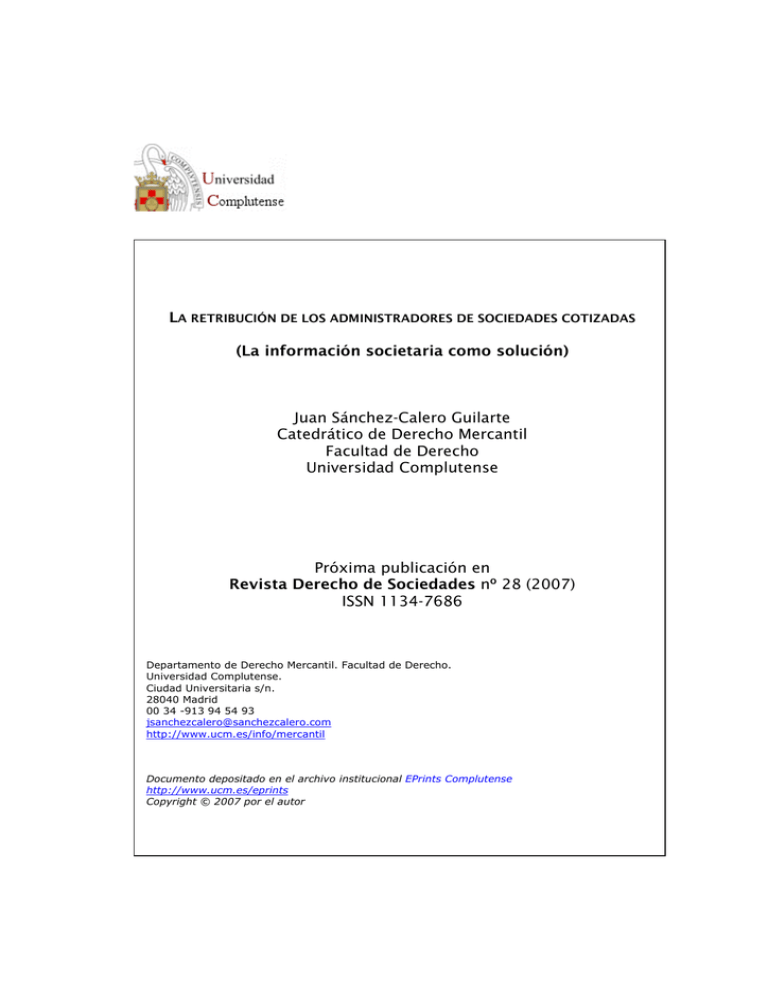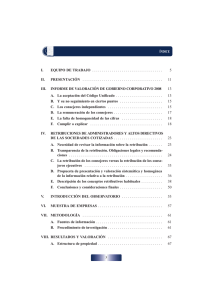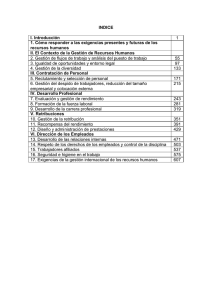(La información societaria como solución) Juan Sánchez
Anuncio

LA RETRIBUCIÓN DE LOS ADMINISTRADORES DE SOCIEDADES COTIZADAS (La información societaria como solución) Juan Sánchez-Calero Guilarte Catedrático de Derecho Mercantil Facultad de Derecho Universidad Complutense Próxima publicación en Revista Derecho de Sociedades nº 28 (2007) ISSN 1134-7686 Departamento de Derecho Mercantil. Facultad de Derecho. Universidad Complutense. Ciudad Universitaria s/n. 28040 Madrid 00 34 -913 94 54 93 [email protected] http://www.ucm.es/info/mercantil Documento depositado en el archivo institucional EPrints Complutense http://www.ucm.es/eprints Copyright © 2007 por el autor LA RETRIBUCIÓN DE LOS ADMINISTRADORES DE SOCIEDADES COTIZADAS (La información societaria como solución) Juan Sánchez-Calero Guilarte Catedrático de Derecho Mercantil Universidad Complutense de Madrid Resumen Este trabajo aborda la retribución de los consejeros en las sociedades cotizadas. Parte de un hecho notorio: ciertas prácticas retributivas han estado en el origen de conocidos procedimientos judiciales que han afectado a las mayores sociedades españolas y a sus principales ejecutivos. La experiencia española al respecto ha coincidido con la vivida en otras jurisdicciones. La cuestión que se plantea es en qué medida esa situación se ve abonada por la legislación vigente y, en consecuencia, si debiera abordarse alguna reforma. Para ello se parte del estudio de la situación actual, en la que el art. 130 LSA aparece como una norma que ha dado lugar a interpretaciones jurisprudenciales vacilantes en relación con el alcance que debe darse al mandato normativo de cobertura estatutaria de cualquier forma de retribución de los administradores. Junto a ello, la información corporativa que hoy resulta fácilmente accesible, nos alerta del problema principal: la retribución de los consejeros ejecutivos. Es en relación con la determinación de esa retribución donde se analiza el núcleo del problema. Hasta ahora, las normas societarias han tolerado una solución opaca, denunciada hace diez años por el Informe Olivencia. Mediante la presentación de una información agregada se abonaba la creencia de una alta retribución “de los consejos”, cuando en realidad son unos pocos consejeros los que se benefician de grandes y variadas prestaciones. Los cambios que se van a producir de manera inmediata apuntan en la dirección correcta. la intervención normativa no pasa tanto por determinar cómo y cuánto deben cobrar los administradores, sino por imponer un sistema de información adecuada. Éste es el que obliga a los consejeros a informar de lo que van a cobrar y a explicar los criterios utilizados. La Recomendación europea de 2004 y el reciente Código Unificado determinan cómo debe llegar a los accionistas esa información y que puedan votar en Junta sobre ella. El trabajo termina con una referencia particular a una de las retribuciones más polémicas: las indemnizaciones para cambios de control y, en especial, ante la formulación de una OPA sobre la sociedad. En este punto, la transparencia informativa impulsada por las disposiciones venideras aparece como una solución acertada. Es previsible que la información previa y completa sobre las soluciones retributivas descarte futuros conflictos y litigios de los vividos en estos últimos años precisamente a raíz de pagos por ese motivo. El debate se producirá en el propio ámbito societario, en el que resultará posible corregir y orientar prácticas retributivas que no merezcan el respaldo de los accionistas. 2 Palabras clave Sociedades cotizadas, gobierno corporativo, consejeros, retribución, información societaria, informes retributivos, votación consultiva. Abstract This paper deals with the remuneration of listed companies’ directors. The starting-point is a notorious fact: certain remuneration practices are in the origin of well-known judicial proceedings that have affected the most important Spanish companies and their main executives. The Spanish experience thereon coincides with other jurisdictions’. The issue is to what extent such situation is fuelled by the legislation in force and, therefore, whether a reform should be undertaken. It starts with the study of the current situation, in which art. 130 LSA (Spanish Corporations Act) seems to be a provision subject to a hesitant case-law regarding the scope to be given to the legal mandate of including any form of directors’ remuneration within the by-laws. Besides, the nowadays so-easily accessible corporate information warns us about the main problem: the remuneration of executive directors. The core of the problem is examined regarding the fixation of such remuneration. Until now, corporate provisions have allowed an opaque solution that was denounced by the Olivencia Report. Through the presentation of aggregate information, the “boards” were believed to be highly remunerated, whilst in fact only a few members of the board profited of large and various benefits. Changes to be immediately enforced aim to the right direction. The intervention of regulations does not necessarily mean to set how and how much should the directors earn, but to impose a system for adequate information. This is the one to force directors to inform about what will be their earnings as well as the criteria therefore. The EU Recommendation of 2004 and the recent Unified Code determine how the shareholders may get that information so that they may vote thereon in the Shareholders’ Meeting. The paper ends with a special reference to one of the most controversial remunerations: the compensations due for change of control and especially as a result of a takeover bid over the company. Herein, informative transparency promoted by upcoming provisions seems to be a right solution. It may be foreseen that previous and thorough information on remunerative solutions will avoid future litigation as the one experienced in the last few years owing to such payments. The debate will take place in the corporate field, in which it will be possible to amend and re-orientate such remuneration practices that are not supported by shareholders. Key words Listed companies, corporate governance, directors, remuneration, corporate information, remuneration reports, consultative voting. 3 SUMARIO I. LA MANIFESTACIÓN DEL PROBLEMA RETRIBUTIVO: A) Breve descripción del problema; B) El tratamiento regulador: entre la autorregulación y las normas precipitadas; C) Las cuestiones relevantes. II. ¿QUÉ RETRIBUCIÓN? (I): LA FIJACIÓN ESTATUTARIA DE LAS FÓRMULAS RETRIBUTIVAS: A) El art. 130 LSA y las sociedades cotizadas; B) El alcance del art. 130 LSA en la jurisprudencia reciente. III. ¿QUÉ RETRIBUCIÓN? (II): LAS "ATENCIONES ESTATUTARIAS" Y LA RETRIBUCIÓN AGREGADA DEL CONSEJO. IV. ¿EL PROBLEMA? LA RETRIBUCIÓN DE LOS CONSEJEROS EJECUTIVOS. V. LAS FORMAS DE RETRIBUCIÓN DE LOS CONSEJEROS EJECUTIVOS: A) Pluralidad de regímenes retributivos v información consolidada; B) Determinación y condiciones de la retribución; C) La cuantía de la retribución no es un problema jurídico. VI. RETRIBUCIÓN FIJA Y RETRIBUCIÓN VARIABLE. VII. LA RETRIBUCIÓN COMO CONFLICTO DE INTERESES. VIII. LA RECOMENDACIÓN EUROPEA Y EL CÓDIGO RETRIBUCIÓN INDIVIDUAL COMO SOLUCIÓN: A) UNIFICADO: LA INFORMACIÓN DE LA Un primer paso decisivo: la Recomendación Europea; B) La concreción del nuevo sistema en el CU. IX. LA RETRIBUCIÓN Y LAS COMPETENCIAS DE LA JUNTA GENERAL: A) La información a la Junta: del informe especial y de los detalles en la Memoria: 1. El Informe sobre política de retribuciones de los consejeros; 2. ¿Otra carga informativa? Informe de Gobierno Corporativo e Informe sobre Política de retribuciones; 3. La difusión del Informe; 4. El detalle en la Memoria de las retribuciones individuales. B) La votación de la Junta: ¿por qué consultiva?. X. OPAS Y CLÁUSULAS DE "BLINDAJE: A) La información obligada sobre dichas cláusulas; B) El fundamento de los blindajes. 4



